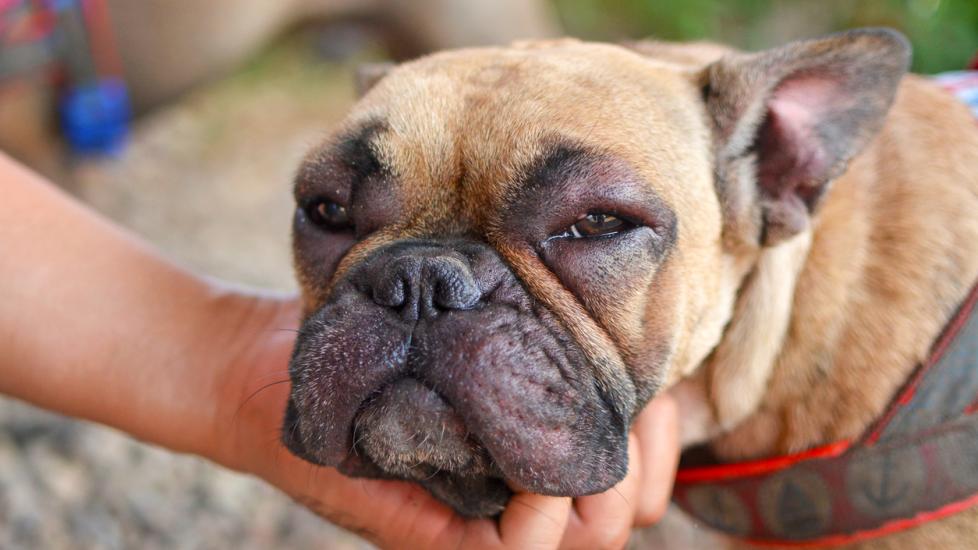Why Does My Dog Have a Swollen Face?
Facial swelling in dogs is considered an emergency situation, because it’s possible for the swelling to move to the airway and cause trouble breathing. Seek immediate medical care if you see more serious symptoms of severe allergic reaction (anaphylaxis or anaphylactic shock), such as difficulty breathing, signs of pain, lethargy, drooling, or dizziness.
A dog’s face will swell when fluid builds up in the tissues. Dogs often get swollen faces from allergic reaction, but there are many other possible causes.
Here are some possible causes of facial swelling in dogs, along with other symptoms to watch for, when to see a vet, and what to expect at the vet visit.
Causes of Facial Swelling in Dogs
Swelling on a dog’s face can be caused by many conditions, but it is most commonly due to dental disease or a reaction to an allergen.
These are some typical allergens that can affect dogs:
-
Dust and molds
-
Insect bites and stings
-
Snake bites
-
Medications
Other causes include:
-
Gingivitis and gum (periodontal) disease
-
Skin cancer (mast cell tumors are the most common cause)
-
Oral cancers
-
Retrobulbar cancer (space behind the eye)
-
Injury
What to Check For if Your Dog’s Face Is Swollen
One clue to figuring out the cause is identifying which part of your dog’s face is swollen:
-
A swollen muzzle could be a sign of dental problems (periodontal disease). Other signs of periodontal disease usually include reddened gums, bad breath, and pain.
-
With swollen salivary glands (a condition called sialocele), the neck and jaw area become swollen.
-
Swelling around the eye (conjunctivitis) is usually accompanied by red eyes and watery discharge.
-
Puffiness around the ears might be due to allergies. When swelling is due to an allergic reaction, other signs can include hives (raised skin areas called wheals), sneezing, and conjunctivitis.
-
Swelling may occur in other parts of the face if the cause is from a tumor (such as mast cell tumors or oral masses)
Swelling of the face or neck can cause trouble breathing and become an emergency situation. It’s always best to contact your vet for facial swelling in dogs or if your dog has hives that worsen or last longer than 24 hours.
How Vets Determine the Cause of Facial Swelling in Dogs
Your veterinarian will perform a physical examination of your dog’s head and neck and check other areas of the body. They will ask questions about when it started, any medications, substances, or allergens your dog may have been exposed to, and your dog’s recent activities. They may recommend testing, including:
-
X-rays: If periodontal disease is suspected, an x-ray may be taken of the jaw.
-
Medications: Antibiotics may be given experimentally in suspected cases of abscess. A diagnosis may be made if the therapy succeeds in treating the abscess.
-
Skin scraping: Tissue may be extracted (by skin scraping or fine needle aspiration) to test for tumors.
-
Computed tomography (CT) or magnetic resonance imaging (MRI): May be used in suspected cases of cancer or severe dental disease and facial fractures.
Treatment of Facial Swelling in Dogs
The treatment depends on the underlying condition that’s causing your dog’s face to swell.
-
Mild swelling may resolve on its own, but you still need a vet to check your pet out and determine why their face swelled up.
-
If the cause is due to dental disease, treatments can range from cleaning to tooth removal.
-
If an abscess has formed, antibiotics will be given to treat the infection, which will reduce the swelling.
-
Allergic reactions will be treated by a range of therapies, depending on the severity:
-
A simple cold compress to relieve itching for mild cases
-
Glucocorticoids, a type of anti-inflammatory steroid
-
Antihistamines (their usefulness in dogs has not been proven in studies)
-
Intravenous fluids may be provided for very serious cases
-
-
When the cause is due to injury or cancer, anti-inflammatory medications may be prescribed to treat swelling while the underlying condition is addressed.
-
Pain medication may also be prescribed for some causes.
Facial Swelling in Dogs FAQs
What can I give my dog for facial swelling?
Do not try to treat the swelling without first immediately consulting your vet, because certain medications can be dangerous to a dog. Be prepared to provide information about your dog’s medical history and possible exposure to a triggering substance.
References
Help us make PetMD better
Was this article helpful?
